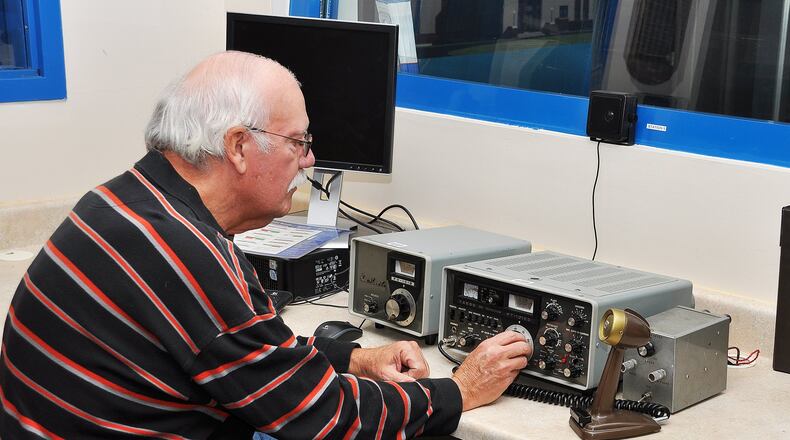“The American Radio Relay League (ARRL) Kid’s Day program is designed to give on-the-air experience to young people, introduce them to amateur radio and generate an interest in the hobby,” said WCARA club president Dennis O’Neill. “It’s important to attract young people to the hobby, as amateur radio operators provide extensive public service.”
With an increasing dependency on internet-based communication systems, shortwave radio operators can help fill a communications void if those systems fail.
Jack Dominic, VOA museum director, said, “Shortwave is a great way for young people and the young at heart to learn the concepts of magnetism and radio waves and communicate with ham radio operators around the world. It’s a lot of fun.”
WCARA operates radio station WC8VOA from the VOA museum building. O’Neill shares more about local amateur radio.
Q: What is the West Chester Amateur Radio Association?
A: WCARA is an American Radio Relay League (ARRL)-affiliated club of members with an interest and pursuit of amateur radio.
We meet once a month to present a technical program and have a weekly open “shack” (a term for the room containing the radio) to get together and share our hobby. This includes on-the-air operating from our well-equipped station at the National Museum of Broadcasting, discussions and sharing of ideas among members and projects. We also participate in local, national and international events such as contests and public service events.
Q: Why is WCARA reaching out to get youth involved in amateur radio?
A: Due to the growing number of convenient means of communication (cellphone, internet, etc.), amateur radio is experiencing an aging population. Since radio is the only reliable means of communication in an emergency, it is important to attract young people to the hobby to continue this capability.
Q: What does an amateur radio operator do?
A: Amateur radio is a multifaceted hobby. There are many activities which participants can pursue.
The basic activity is two-way communication with a radio (a transceiver, which combines a receiver and transmitter). Since these communications occur on shortwave frequencies, conversations can take place locally or across the globe (called DX). We also use “repeaters” where the transmission is relayed, which extends the coverage. We also use internet connections (including smart phones) to talk with people all over the world. And there are various emergency preparedness organizations which hold regular training.
Q: Why is this skill important?
A: Amateur radio operators must be licensed by the Federal Communications Commission. The license (obtained through testing) demonstrates that the operator knows basic radio theory, regulations and operations.
With some experience, the amateur radio operator can be of valuable assistance in providing public service communications in emergencies or during other activities (such as parades, races, etc.). In other words, while pursuing a hobby which yields great pleasure, we are also very useful to our communities and the world.
Q: What do you enjoy most about your work with WCARA?
A: The most enjoyable part of WCARA is spending time with the members and being part of the VOA museum.
Q: What is a goal of yours as WCARA president?
A: I would like to increase our participation with the community in various forms of public service.
Contact this contributing writer at lisa.knodel@gmail.com.
Volunteer docents sought
The Voice of America Museum of Broadcasting museum board is seeking volunteer docents as it expands opening hours. Volunteer docents are needed to work four-hour, weekend shifts to allow the museum to open each weekend. Currently, the museum, located at 8070 Tylersville Road, is open on the third Saturday of each month from 1 to 4 p.m. Admission is $5 for adults and $1 for children.
No advance knowledge of the VOA, radio or Cincinnati broadcast history is required to participate in the docent program. Docents will learn the history of the VOA-Bethany Station and key points of the museum’s Gray History of Wireless Museum radio and Media Heritage Cincinnati Museum of Broadcast History collections. Volunteers are also needed to staff admissions.
For more information or to volunteer as a VOA museum docent, email admin@voamuseum.org or call museum director Jack Dominic at 513-777-0027.
About the Author
